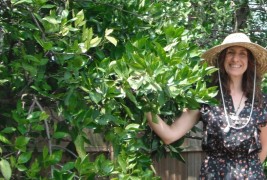When the human immune system is healthy and operating effectively and efficiently, exposure to bacteria will not generally trigger a reaction but if the immune system is compromised, the bacteria can cause negative impacts to the body. The Florida citrus industry is experiencing the impacts of a bacterial infection. The immune systems of citrus trees are being compromised by bacteria that cause a disease known as citrus greening. The disease is being spread by two species of psyllid insects that have a tendency to be host specific and are focused on citrus.
Citrus greening can lead to a decrease in the production of fruit as well as produce oddly shaped and discolored, bitter fruit. Generally within three to five years, once the tree has become infected, it will require removal and replanting, thus causing a dramatic decrease in the life expectancy of a productive citrus tree from a minimum of 50 years to 15 years or less. Younger citrus trees appear to attract the insect that carries the bacteria within its gut due to the continual tree growth that is occurring, whereas the older trees tend to be more tolerant. According to the Institute of Food and Agricultural Sciences at the University of Florida, (see full article here) citrus greening has cost Florida’s economy an estimated $3.63 billion in lost revenues and 6,611 jobs since 2006 due to the subsequent reduction in orange juice production.
Research & New Approaches to Combating Citrus Greening
Based upon research that is being conducted through the University of Florida, an alternative to applying pesticides during the early stages of tree growth is to utilize plastic silver mulch around the tree. It appears that the reflected light from the mulch acts as a deterrent to the insect. The next stage of the citrus greening dilemma is what course of action can be taken if the tree is currently infected.
 Research is also being conducted to determine the chemical composition that will eradicate the insect but there is a company that is taking a different route.
Research is also being conducted to determine the chemical composition that will eradicate the insect but there is a company that is taking a different route.
Rather than apply another layer of chemicals, the idea is to supply the plant with additional nutrients that can act as life support for the plant’s immune system. The product is Tara 14 and is produced by Tara Solutions, a company whose headquarters is located in Tampa, Florida. The primary ingredient is the organic compound urea, which acts as a nitrogen source, in addition to trace minerals. Phosphorus is not a constituent in the solution, therefore not creating additional demand for phosphate mining in Florida.
The product is registered as ‘generally regarded as safe, contains no hazardous ingredients’ and no health hazards are listed for Tara 14. According to Cesar Diaz, the president of Tara Solutions, Tara 14 improves the plants ability to uptake nutrients.
Protecting Crops and the Environment
The nitrogen cycle plays a critical role in a plant’s life cycle and ultimately its health.
A current concern in the state of Florida is nutrient (nitrogen and/or phosphorus) enrichment of surface water bodies, which can potentially lead to lower levels of oxygen that can trigger algal blooms, a decrease in water clarity and a general decline in the health of the biological system. Land applied fertilizers can contribute to increased nutrient concentrations in groundwater and surface water. In response to the impacts of fertilizers on water resources, Hillsborough, Pinellas and Sarasota Counties has enacted residential ordinances that restrict fertilizer use based upon the time of the year, the quantity of nitrogen and phosphorus within the fertilizer and the distance from a body of water.
To increase the plant’s uptake effectiveness of the product, Tara 14 is dissolved in water and applied to the surface of the tree leaves, thus alleviating the impact of increased nitrogen to the groundwater in the vicinity of the tree. The ratio of Tara 14 and water is determined by a Tara Solutions representative on a project specific basis to ensure that the product is applied in appropriate proportions.
Representatives from Lee County and the University of Florida have conducted a test that involved applying Tara 14 to citrus trees that were indicating signs of the bacterial infection. The positive results of the test as indicated by increased health of the tested citrus trees have inspired Ecology Florida president, Dell deChant, to conduct a test of his own.
Tara 14 will be applied to two citrus trees in New Port Richey that have been experiencing decreased fruit production, discoloration, leaf drop and general stressed health to determine the effectiveness of the product on a local scale. The results of the local application test of Tara 14 will be reported by Ecology Florida. Hopefully the research being conducted on the eradication of citrus greening will result in a solution that does not lead to other negative impacts.


Leave a Reply